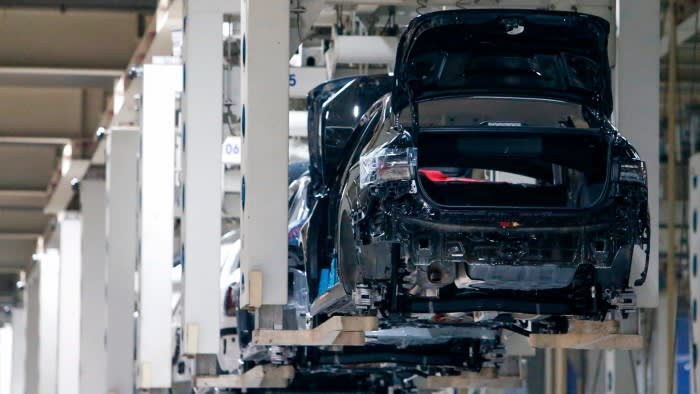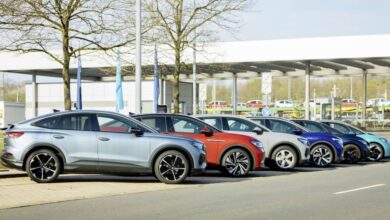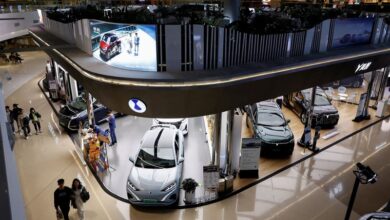Automakers electrify Brazil’s unique sugarcane cars

As the global automotive industry turns to vehicles powered by batteries containing minerals like lithium, nickel and cobalt, manufacturers in Brazil believe the future of cleaner cars lines in a combination of 21st century electric technology and an old world commodity: sugar.
Most passenger automobiles sold in Latin America’s largest economy are already capable of running on a mix of petrol and lower-emission ethanol, a biofuel which in Brazil is mainly derived from sugarcane.
Multinational automakers including Stellantis, Volkswagen, Mitsubishi and China’s Great Wall Motor are now making investments worth billions of dollars to add a degree of electrification to these so-called flexible fuel cars.
The wager is on a technological variant virtually unique to the South American nation: biofuel versions of hybrid automobiles, which use both a traditional internal combustion engine and an electric motor for propulsion.
Such vehicles are known as “flex hybrids”. Brazil’s auto industry casts the unusual category as an important stepping stone in the quest to reduce carbon dioxide pollution from tailpipes.
However some environmentalists question whether the cleaner credentials of ethanol in fact threatens to hinder the country’s adoption of fully battery run cars — the “cleanest” vehicles of all.
Roberto Braun, director of environmental, social and governance at Toyota do Brasil, described flexible-fuel hybrid technology as “the best and most suitable” for the country.
“A flex hybrid vehicle in Brazil fuelled with ethanol has very similar CO₂ emissions to an electric vehicle powered by electricity in Europe,” he said. “As Brazil is a major player in biofuels, it has an alternative [path to] decarbonisation beyond what other countries are considering”.
Having launched the world’s first flex-fuel hybrid there in 2019 and with 75,000 sold to date, the Japanese company plans to unveil another two such models over the next few years under a R$11bn ($2.1bn) capital spending package announced in March.
Flex hybrids feature across a recent wave of investment promises to upgrade Brazilian automaking. Carmakers have pledged some R$77bn ($14.bn) to the country in 2024 alone, sparking hopes of a revival in the sector after a decade of stagnation.
Braun notes that the flex hybrid model is “a practical technology because it does not require electrical recharging or any change in consumer habits.”
“Hybrid-flex costs around 10 to 15 per cent more than a normal flex vehicle in the same category, so it is not very far off in terms of price,” he adds.
Defenders of ethanol, which is available at all filling stations in Brazil, say it is a viable low-carbon option in a developing economy where the higher prices of EVs are prohibitive for most consumers. The sugarcane-based fuel can lower CO₂ emissions by 73 per cent compared with petrol, according to a 2009 study by Brazil’s state-run agricultural research institute, Embrapa.
At the same time, Brazil’s size and varied terrain makes the rollout of charging infrastructure an enormous challenge.
However, some environmentalists argue that the biofuel’s prominence threatens to hinder the adoption of fully-battery run cars.
Brazil is the seventh-largest car market globally but trails richer countries on EVs. While sales of battery run vehicles and hybrids almost doubled in 2023 to 94,000, they only made up 4.3 per cent of all passenger and light commercial vehicle deliveries.
“The longer Brazil commits to ethanol, the higher its chance of becoming a laggard in this new technological paradigm,” said Luciana Castilla, an energy transition researcher at the University of São Paulo.
If manufacturers and buyers stick with flex vehicles, the corollary is that the industry could struggle to achieve the economies of scale required to bring down the costs of full EVs to more affordable levels, sceptics argue.
Brazil’s love affair with ethanol goes back to the 1970s, when the international oil crisis led the military dictatorship to promote the biofuel. Sugarcane plantations were a cornerstone of Portuguese colonisation and remain an important industry today.
Since flex-fuel cars were first introduced two decades ago by VW, they have come to account for about 90 per cent of overall passenger vehicle sales — resulting in the biggest fleet in the world.
Even motorists who do not fill up on pure ethanol end up burning it, since by law petrol must be blended with 27 per cent of the biofuel, the highest level mandated globally. Other markets use lower ethanol blending, such as a 10 per cent ethanol-gasoline mix common in the UK, Thailand and US.
If green campaigners worry that flex-fuel hybrids might hold back more advanced electrification, BYD and Toyota are looking to push the technology forward by designing “plug-in” versions, which are further up the electrification scale than a normal flex hybrid.
“We will soon have the launch of this model, technologically developed in Brazil and increasing the performance and autonomy of a car powered by ethanol,” said BYD’s local chair Alexandre Baldy.
Whereas regular hybrids do not require external charging and are more reliant on the combustion engine, plug-in hybrids offer dozens of miles of driving in electric-only mode.
Yet there remain doubts about the environmental effectiveness of the focus on flex hybrids, even those of the plug-in variety.
André Cieplinski, a researcher at the non-profit International Council on Clean Transportation, described it as a “risky route”, explaining that studies suggested emissions reductions from plug-in hybrids were lower than previously thought.
“Adopting strategies now that have a more limited mitigation potential could result in rushed and more costly policies in the future if we are to meet [Brazil’s] net zero goal by 2050,” he added.
The industry’s wider bet is that the different technologies on offer to Brazilian motorists will help spur a new era for national carmaking, following numerous factory closures in recent times. Against the backdrop of long-running economic malaise, the sector has struggled to recover to 2013’s peak output of just under 3mn passenger cars, with 1.8mn units manufactured last year.
Although globally flex-fuel vehicles are relatively niche — the US, Canada and Sweden are other notable markets — proponents in Brazil see potential for exporting them to neighbouring Paraguay and India, where officials believe the biofuel can lessen oil imports.
Despite its national preference for sugarcane cars, Brazil is pushing ahead with production of full battery electric vehicles (BEV). BYD plans to begin assembly by the end of this year, with full domestic production by mid-2025.
The Chinese group, which is the world’s leading EV maker by volume, is setting up its first car factory outside Asia in the Brazilian state of Bahia and recently increased its investment budget to R$5.5bn.
The most complex and expensive part of electric cars is the battery, which for now will be imported to Brazil. But as the country begins large-scale lithium mining, Brasília’s eventual aspiration is for domestic manufacture of this key component.
“There needs to be demand and scale for it not to be too expensive,” said Ricardo Bastos, president of the Brazilian Association of Electric Vehicles who is also a director at Great Wall Motor. “Brazil cannot get stuck in combustion technology,” he added. “The world is already demanding electric cars, so we will have to be able to produce them here.”
Additional reporting by Beatriz Langella



